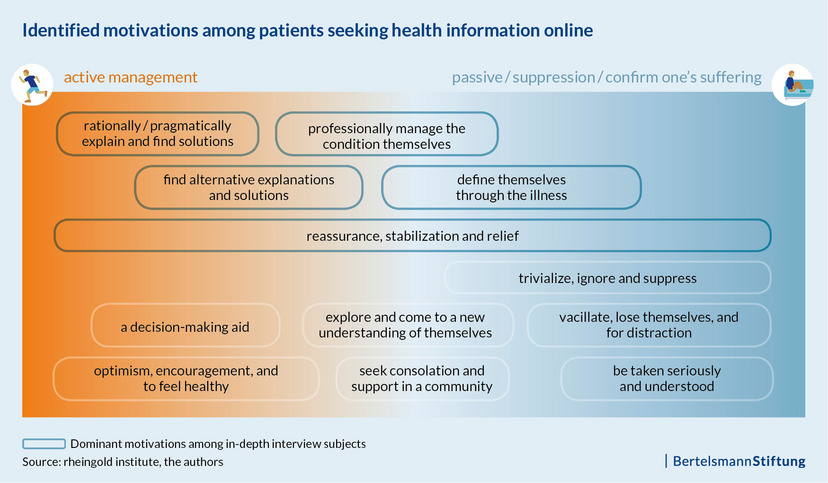
Getty Images/iStockphoto/golibo
Patients value "Dr. Google's" versatility
Whether preparing for a visit to the doctor, comparing therapies or simply engaging in online discussion with others – many people seek advice from "Dr. Google". Findings from our new study show that more than one-half of patients surveyed are satisfied with the health information they find online. But are physicians and patients making good use of the internet's potential?
From hard facts to consolation to distraction, patients generally find what they are looking for in "Dr. Google". These are the findings of in-depth interviews conducted on our behalf by Rheingold Institute, a market research institute. This qualitative study exploring how patients seek and use health information online was supplemented by a representative survey of residents in Germany by Kantar Emnid showing that patients are satisfied with the information they find online. The study also shows how patients in Germany use "Dr. Google", how the internet can support physician-patient relationships and what challenges must be addressed.
Online health information is often better than expected
In-depth interviews reveal a broad range of motivations among those seeking online health information. Patients turn to "Dr. Google" in order to review referrals, explore alternative treatments, engage in discussion with others and find emotional support. Researching health information online can provide a sense of security, reassurance or serve as a distraction.

Bertelsmann Stiftung
Whether seeking facts, consolation or distraction, the motivations for researching health information online varies among patients.
The motivations for seeking information online may vary, but most patients express satisfaction with the hits received. Some 52 percent of those surveyed stated they are "usually or always satisfied," 44 percent reported being "somewhat satisfied," while only 2 percent reported being "rarely satisfied." Indeed, the survey results showed that nobody was "never satisfied."
"Contrary to what is often claimed, the internet is valued as a place to find advice. Patients find what they are looking for online."
Brigitte Mohn, member of the Bertelsmann Stiftung Executive Board
"Dr. Google" is easy to contact, always accessible, available everywhere, has unlimited time and offers expert advice for laypeople. And what is more – those who seek health information online will find sound to very high-quality information on a number of portals with a broad reach, as the Goethe University Frankfurt reported in 2017 for the German-language Ökotest (Ecotest) magazine.
Yet patients nonetheless will occasionally be confronted with false claims in their online research and place their faith in unprofessional websites. "In order to protect patients from being the targets of false information, we need a market watchdog authority to keep an eye on such efforts. So far, relatively few ideas have been introduced and efforts to enforce accountability are lacking. Developing effective strategies to address this problem is a matter of urgency," says Mohn.
Online potential not being leveraged
Our research shows that next to physicians and family or friends, the internet is the third most-consulted source of information on health matters. Survey respondents stated that many physicians have recognized the importance of "Dr. Google" for patients. According to respondents, more than 60 percent of physicians respond to the information patients have researched themselves. Yet only 40 percent of physicians point to good sources of information and only one-fifth encourage their patients to seek information themselves. Some 14 percent advise patients against doing so.
"In many physicians' offices, the potential of Dr. Google is often overlooked. Patients should feel free to discuss information they have found on their own, and physicians or therapists should be able to recommend reliable websites or apps," asserts our health expert Marion Grote-Westrick. However, some 30 percent of patients do not tell their physician that they have consulted "Dr. Google".
How can we make better use of online health information to foster good treatment results?
Our recommendations:
- All stakeholders in the health system should recognize the diversity of health information available on the internet and that this meets patients' range of needs. Electronic health records could also be used as a platform for providing patients with health information.
- Physicians should encourage patients to inform themselves. They should also be familiar with good sources of information that they can recommend to patients as they prepare for a visit to the doctor, a hospital stay or their return home after a hospital stay.
- Patients should speak openly with their physician about the information they have found.
These and further findings are summarized in our "Spotlight Healthcare" publication.




